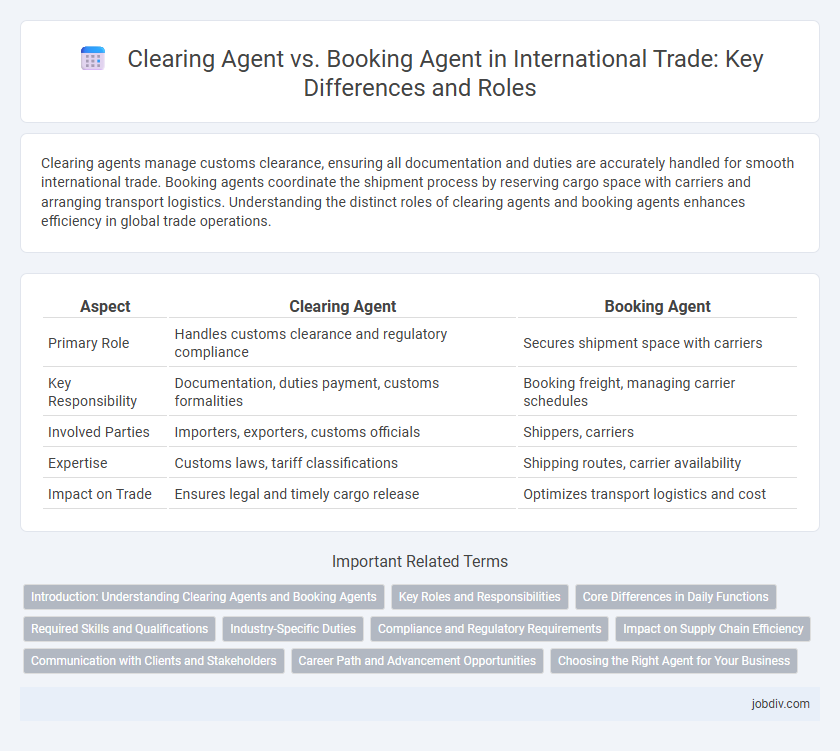Clearing agents manage customs clearance, ensuring all documentation and duties are accurately handled for smooth international trade. Booking agents coordinate the shipment process by reserving cargo space with carriers and arranging transport logistics. Understanding the distinct roles of clearing agents and booking agents enhances efficiency in global trade operations.
Table of Comparison
| Aspect | Clearing Agent | Booking Agent |
|---|---|---|
| Primary Role | Handles customs clearance and regulatory compliance | Secures shipment space with carriers |
| Key Responsibility | Documentation, duties payment, customs formalities | Booking freight, managing carrier schedules |
| Involved Parties | Importers, exporters, customs officials | Shippers, carriers |
| Expertise | Customs laws, tariff classifications | Shipping routes, carrier availability |
| Impact on Trade | Ensures legal and timely cargo release | Optimizes transport logistics and cost |
Introduction: Understanding Clearing Agents and Booking Agents
Clearing agents specialize in managing customs clearance, ensuring that goods comply with export and import regulations, and facilitating the smooth movement of shipments across borders. Booking agents, on the other hand, focus on securing cargo space with carriers, arranging transportation schedules, and confirming shipment bookings to meet delivery deadlines. Both roles are critical in international trade logistics, streamlining processes and minimizing delays in the supply chain.
Key Roles and Responsibilities
Clearing agents specialize in managing customs documentation, ensuring compliance with import-export regulations, and facilitating the smooth clearance of goods through customs authorities. Booking agents are responsible for reserving cargo space with carriers, coordinating shipment schedules, and confirming transportation arrangements to optimize logistics efficiency. Both agents play pivotal roles in global trade, with clearing agents focusing on regulatory clearance and booking agents handling transport coordination.
Core Differences in Daily Functions
Clearing agents specialize in customs clearance, handling documentation, duties, and regulatory compliance to ensure smooth import and export processes. Booking agents focus on securing cargo space with shipping lines or airlines, managing freight reservations and scheduling shipments. These distinct roles complement each other, with clearing agents facilitating legal clearance and booking agents coordinating transportation logistics.
Required Skills and Qualifications
Clearing agents require in-depth knowledge of customs regulations, documentation processes, and effective communication with customs authorities to ensure smooth goods clearance. Booking agents must possess strong organizational skills, familiarity with shipping schedules, and proficiency in logistics software to secure cargo space efficiently. Both roles demand attention to detail, problem-solving abilities, and industry-specific certifications such as a Customs Broker License for clearing agents or freight forwarding accreditation for booking agents.
Industry-Specific Duties
Clearing agents handle customs documentation, import-export compliance, and payment of duties to ensure smooth cargo clearance, while booking agents specialize in reserving cargo space with carriers and managing shipment scheduling. In trade logistics, clearing agents coordinate with customs authorities to expedite clearance processes, whereas booking agents liaise with shipping lines or airlines to secure transport capacity and confirm itinerary details. Both roles are essential for efficient supply chain operations but focus on distinct stages of the shipping workflow.
Compliance and Regulatory Requirements
Clearing agents specialize in ensuring shipments comply with customs regulations, managing documentation, and facilitating the legal clearance of goods across borders. Booking agents primarily handle the reservation of cargo space with carriers, focusing on logistics coordination rather than regulatory compliance. Understanding the distinct roles in compliance and regulatory adherence is critical for maintaining efficient and lawful trade operations.
Impact on Supply Chain Efficiency
Clearing agents expedite customs clearance by managing documentation and regulatory compliance, reducing delays at ports and facilitating faster cargo release. Booking agents coordinate shipment reservations with carriers, ensuring optimal vessel space allocation and timely cargo movement. Efficient collaboration between clearing and booking agents minimizes bottlenecks, enhancing overall supply chain efficiency and reducing lead times.
Communication with Clients and Stakeholders
Clearing agents specialize in managing customs documentation and regulatory compliance to ensure smooth cargo clearance, requiring precise communication with customs authorities and clients to avoid delays. Booking agents coordinate shipment schedules with carriers and clients, focusing on timely updates and negotiation to secure space and optimize logistics. Effective communication from both agents facilitates transparency and minimizes disruptions in the supply chain.
Career Path and Advancement Opportunities
Clearing agents specialize in customs clearance, compliance, and documentation, offering career growth in logistics coordination, customs regulation expertise, and supply chain management. Booking agents focus on cargo space reservation, carrier negotiations, and shipment scheduling, leading to roles in freight forwarding, sales, and transportation management. Advancing as a clearing agent often involves certifications like customs brokerage licenses, while booking agents benefit from developing negotiation skills and industry networks for higher positions in global trade operations.
Choosing the Right Agent for Your Business
Choosing the right agent for your business depends on your specific trade needs: clearing agents specialize in customs clearance, ensuring compliance with import/export regulations, while booking agents focus on securing cargo space and managing shipment schedules. Engaging a clearing agent streamlines the documentation process and reduces risk of delays at borders, which is crucial for timely delivery. Partnering with a booking agent is essential when optimizing logistics and negotiating freight rates to maximize cost efficiency.
Clearing Agent vs Booking Agent Infographic

 jobdiv.com
jobdiv.com